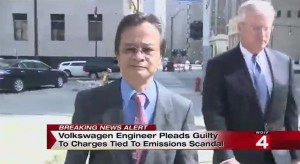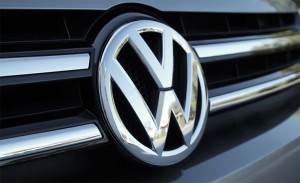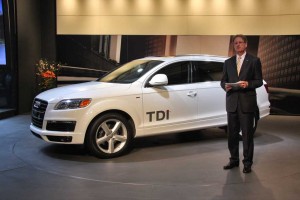After already agreeing to claims and penalties worth nearly $20 billion, Volkswagen now faces more than 1,400 investor lawsuits that could cost it another $9 billion.
A flood of lawsuits have landed on the doorstep of the regional court in Braunschweig, Germany as a one-year deadline for filing claims approaches. It was on September 18, 2015 that the U.S. Environmental Protection Agency accused the automaker of rigging 475,000 vehicles equipped with a 2.0-liter turbodiesel to pass American emissions tests.
The automaker quickly acknowledged the subterfuge – which involved a total of 11 million vehicles sold worldwide – and also admitted using a so-called “defeat device” on a higher-end 3.0-liter diesel sold by the Audi and Porsche brands, as well as through VW.
The revelations quickly took a toll on Volkswagen’s stock. In the months prior to the revelations, it was trading as high as 253 euros. When the scam was revealed, shares immediately tumbled by as much as 23%, wiping out about 15.6 billion euros in market value, or $17.6 billion at the time. Shares have remained in the doldrums, currently running around 120 euros.
(In wake of diesel scandal, VW reorients its U.S. operations. To find out more, Click Here.)
In the various lawsuits, investors generally claim that VW hid from them critical information about the diesel cheating, especially the potential cost of the scam, that might have impacted investment decisions.
About 1,440 lawsuits were filed by Wednesday morning, more than half coming in this week alone.
For its part, the automaker insists it properly disclosed all necessary information, and points to the 18 billion euro, or $20 billion, set aside so far. It issued a statement Wednesday contending it “remains of the opinion that it duly fulfilled its disclosure obligations under capital markets law. This view has also been confirmed by a careful examination by internal and external legal experts.”
Prior to the public disclosure by the EPA, VW had been trying to negotiate a settlement with the agency and appears to have believed its costs would be significantly lower than has turned out to be the case, perhaps as little as $100 million.
In fact, the automaker reached a $14.7 billion settlement with the EPA and other U.S. and California government agencies in June, $10 billion of that for a vehicle buyback program. And that only covers the 2.0-liter engine. Negotiations involving the 3.0-liter turbodiesel are still underway.
A separate agreement covering VW’s U.S. dealers will cost about $2 billion more.

VW diesel engineer James Liang could help investigators trace who was responsible for the emissions cheating scandal.
Meanwhile, the U.S. Justice Department continues a criminal investigation. It recently accepted a guilty plea by a VW engineer who acknowledged his role in writing software designed to reduce pollution levels during emissions tests. He has agreed to cooperate with DOJ investigators and others are expected to be charged.
(After pleading guilty, VW engineer helping with diesel investigation. Click Here for the story.)
German prosecutors are also looking into the scam and have named former VW CEO Martin Winterkorn – who was ousted weeks after the scandal was revealed – as one target. He could be charged with knowingly withholding information from investors.
Along with Winterkorn, a number of senior executives have been caught up in the scandal, a list that grew this week with the suspension of Audi R&D chief Stefan Knirsch.
(For more on his role in the diesel scam, Click Here.)


